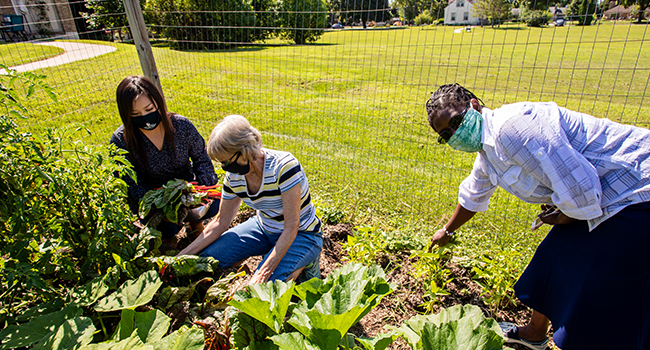Prioritizing Care of Creation
The School Sisters of Notre Dame (SSND) hold Care of Creation as a main focus in their drive to live out their mission. This focus is accomplished in a variety of ways. The 2021 Virtual Women’s Leadership Luncheons will provide the opportunity to educate women on Care of Creation and how prominent women are achieving this goal in their community.
One of the speakers for the St. Louis 2021 Virtual Women’s Leadership Luncheon is Shannon Hauf, Senior Vice President and Head of Seed Production Innovation for Bayer Crop Science. She grew up on a farm in southern Minnesota and she never forgot her roots. Much of the work she does with Bayer revolves around making sure farmers all around the world have access to the best possible seeds in order to get the best possible harvest. She wants people to understand how important farmers are, “Farmers are great servants of the environment, and they have the most to lose if they don’t take good care of the environment, they won’t have the opportunity to farm next year. It’s really just that simple.” She still plants food and flowers in her own time and gets joy from the experience, “I love to prepare the soil, plant the seed and take care of the crop. I love to see the crop mature. My favorite time of the year is harvest. I love being out in a combine (harvester) seeing what you worked for all year.”

Another avenue to accomplish the SSND goal of Care of Creation is to put into practice some of the key points in caring for Earth. While sisters and ministries throughout the Central Pacific Province participate in caring for the Earth by recycling, reusing and gardening, one project stands out. Sisters in Milwaukee have created a little community garden on the Mount Mary University campus. This garden is located outside the International House where three SSND live. While this garden has a variety of every day garden plants, there are a few other plants that might be surprising. For example, Sister Millie Oduor, from the Province of Africa, who is living and studying at MMU, plants and harvests chickpeas, commonly found in Africa.
Sister Patricia Rass, who lives and works at the International House, tends to the garden on a regular basis. She shares that the garden has grown “lettuce, peas, green beans, okra, tomatoes, kale, beets, squash, swiss chard and peppers. We have been eating most of the vegetables right after picking. What we have too much of, we cook and freeze or share with others.” When the community garden was initially planted, sisters would not only pick the produce to eat for themselves, but also they would donate produce to a local food pantry.